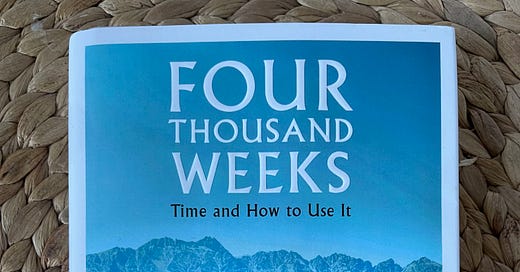10. Four Thousand Weeks | Oliver Burkeman
Heard about this book here, and bought her here.
Friends,
Did you know that we have on average just 4,000 weeks as humans on this precious earth? I had no idea it was that short! It feels violently short when it’s put like that.
I loved this book! I’m going through a period of immense change in my own life so naturally I found her when I did.
From the book cover:
“We’re obsessed with our lengthening to-do lists, our overfilled inboxes, the struggle against distraction and the sense that our attention spans are shrivelling. Still, we rarely make the connection between our daily struggles with time and the ultimate time-management problem: the question of how best to use our ridiculously brief time on the planet, which amounts on average to about four thousand weeks.”
Some parts I’ve highlighted as I’ve read:
“We must live out our lives, to whatever extent we can, in clear-eyed acknowledgement of our limitations, in the undecided mode of existence that Heidegger calls ‘Being-towards-death’, aware that this is it, that life is not a dress rehearsal that every choice requires myriad sacrifices, and that time is always already running out - indeed, that it may run out today, tomorrow or next month. And so it’s not merely a matter of spending each day ‘as if’ it were your last, as the cliché has it. The point is that it always actually might be.“
“A life spent focused on achieving security with respect to time, when in fact such security is unattainable, can only ever end up feeling provisional - as if the point of your having been born still lies in the future, just over the horizon, and your life in all it’s fullness can begin as soon as you’ve put it ‘into proper working order.”
“You realise that you never really needed the feeling of complete security you’d previously felt so desperate to attain. This is a liberation. Once you no longer need to convince yourself that the world isn’t filled with uncertainty and tragedy, you’re free to focus on doing what you can to help. And once you no longer need to convince yourself that you’ll do everything that needs doing, you’re free to focus on doing a few things that count.”
“The average human lifespan is absurdly, terrifyingly, insultingly short. But that isn’t a reason for unremitting despair, or for living in an anxiety-fuelled panic about making the most of your limited time. It’s a cause for relief. You get to give up on something that was always impossible - the quest to become the optimised, infinitely capable, emotionally invincible, fully independent person you’re officially supposed to be. Then you get to roll up your sleeves and start work on what’s gloriously possible instead.”
And this beautiful letter by Carl Jung towards the end of the book:
Dear Frau V.,
Your questions are unanswerable because you want to know how one ought to live. One lives as one can. There is no single, definite way for the individual which is prescribed for him or would be the proper one. If that’s what you want you had best join the Catholic Church, where they tell you what’s what. Moreover this way fits in with the average way of mankind in general. But if you want to go your individual way, it is the way you make for yourself, which is never prescribed, which you do not know in advance, and which simply comes into being of itself when you put one foot in front of the other. If you always do the next thing that needs to be done, you will go most safely and sure-footedly along the path prescribed by your unconscious. Then it is naturally no help at all to speculate about how you ought to live. And then you know, too, that you cannot know it, but quietly do the next and most necessary thing. So long as you think you don’t yet know what this is, you still have too much money to spend in useless speculation. But if you do with conviction the next and most necessary thing, you are always doing something meaningful and intended by fate. With kind regards and wishes,
Yours sincerely,
C.G. Jung
Oliver is one of my favourite Guardian journalists and his best (imho) article is well worth a read.





